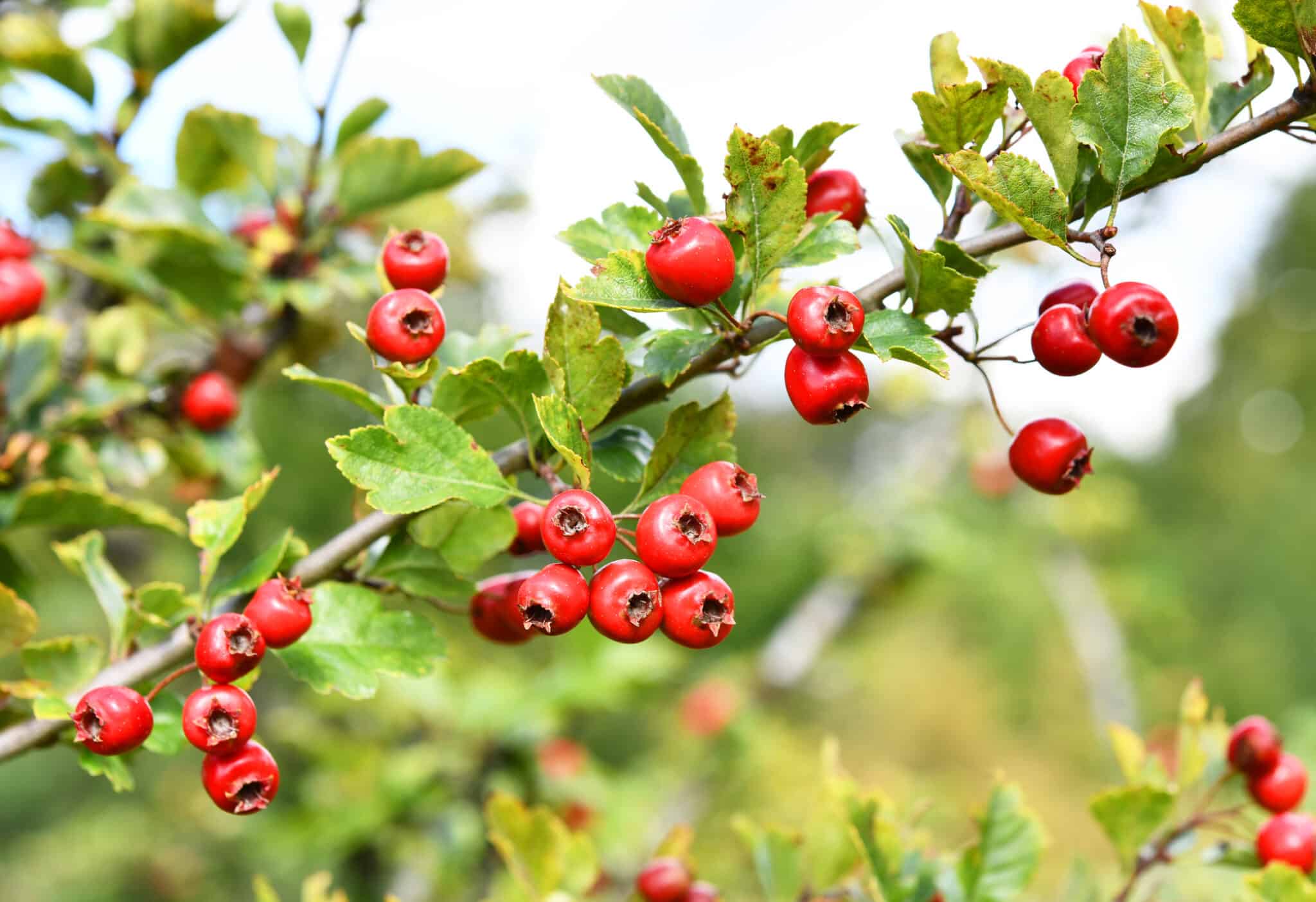

Hawthorn grows as both a shrub and tree across North America, Europe and Asia. As a member of the Rosaceae (rose) family, it protects itself with sharp thorns. Hawthorn possesses a somewhat overlooked medicinal secret: Hawthorn berries, packed with both a mild sweetness and a tangy tartness. From heart tonic to anxiety relief, here are five health benefits of hawthorn berry.
1. It’s an Ancient Tonic for Heart Health
In Traditional Chinese Medicine (TCM), Hawthorn berry is known as a heart tonic, and recent research shows that these “fire berries” are cardioprotective.
A 2018 review published by the NIH National Library of Medicine names hawthorn berry as a cardiotonic herb. Hawthorn berries contain phytonutrients (anthocyanidins and proanthocyanidins), antioxidants that tonify and strengthen blood vessel walls. The plant presents positive inotropic and negative chronotropic effects as well as a rise in coronary blood flow and exercise tolerance.
Hawthorn extracts including the berries, leaves and flowers are also used to treat such heart conditions as bradyarrhythmia and angia, according to a 2016 report published in Nutraceuticals. However, hawthorn in general may increase the potential for bleeding in patients who take antiplatelet or anticoagulant agents.
Should you take hawthorn berries for palpitations? While hawthorn berries have shown to be a cardiotonic, consult your doctor before incorporating this herb into your treatment regimen, including extracts or teas.
2. It Acts as a Digestive Aid
Hawthorn berries contain fiber, a digestive aid that acts as a prebiotic to decrease constipation. Prebiotics induce and nurture the growth of good gut bacteria essential for a healthy digestive system.
Hawthorn (its berries, leaves and flowers) have been found helpful in the treatment of gastrointestinal diseases and other digestive issues, according to a 2015 critical review published in Nutrients that analyzed 88 scientific papers. The review shows that hawthorn presents useful applications for the treatment of abdominal pain, diarrhea, distension and indigestion. The paper notes its use as an effective diuretic in the European tradition.
3. It May Help Prevent Hair Loss
Hawthorn berry is listed as a natural ingredient in some hair care and hair growth products, but is it effective? In the past, hawthorn berry has shown promise in stimulating the growth and size of hair follicles in rats. The polyphenol content in these berries is believed to cause these effects. However, further research on the effects in humans is needed.
How do you use hawthorn berry in your hair? Many people prefer to include hawthorn berries in their diet, such as making hawthorn berry syrup for pancakes and absorbing the nutrients that way. Others invest in over- the- counter natural hair care products like hawthorn berry butters or tonics.
David Hoffmann, BSc, a founding member and past president of the American Herbalists Guild, recommends making tea by steeping a teaspoon of hawthorn berries in a cup of hot water and then straining it before consuming. He advises not to exceed three cups a day. A consultation with an herbalist can give you more guidance, but you should first talk to your doctor about using such complementary treatments.
4. It Fights Free Radicals
Free radicals are unstable atoms linked to aging, chronic disease and cancer. The 2015 scientific literature review of 88 papers published in Nutrients noted that hawthorn berries contain significant amounts of polyphenols, an antioxidant compound that fights free radicals. Aside from the antioxidant capacity of polyphenolic compounds, they also are protective against inflammation and other markers for chronic disease.
5. It Could Reduce Anxiety
Hawthorn extracts may contain compounds from the berries, flowers and leaves of the hawthorn plant that help reduce anxiety. One older double-blind study published in Current Medical Research and Opinion analyzed a formulation of hawthorn extract, California poppy flower, and magnesium and its effects on 264 people with anxiety. The results revealed a significant reduction in mild to moderate anxiety levels compared with the placebo. However, the specific role that hawthorn played was not analyzed in depth.
The NIH National Center for Complementary and Integrative Health also notes the promotion of hawthorn for use in anxiety treatment.
Does Hawthorn Berry Contain Any Nutrients?
Yes. According to the third edition of The Encyclopedia of Common Natural Ingredients, hawthorn berry is rich in many beneficial chemical compounds and nutrients, including:
- Acetylcholine
- Chlorogenic acid
- Caffeic acid
- Choline
- Calcium
- Iron
- Phosphorus
- Vitamin B1
- Vitamin B2
- Vitamin C
What Are the Side Effects of Taking Hawthorn?
Hawthorn berry supplements often contain the berry, flowers and leaves. The NIH National Center for Complementary and Integrative Health Indicates that the most common side effects of taking hawthorn may include nausea, dizziness and digestive symptoms. Those taking anticoagulants should avoid consuming hawthorn.
Always consult with your doctor or a registered dietitian before adding any supplements to your diet. Many products have different dosage recommendations, and your healthcare provider can best direct you as they know your medical history.
Tiffany Chaney is an environmental and wellness writer dedicated to advocacy, ethics, and transparency. Chaney holds a BA in creative writing from Salem College and completed an apprenticeship in western herbalism and Traditional Chinese Medicine at the Tree of Life Wellness Center and Piedmont Herb School in Winston-Salem, NC. She is also a published creative writer and artist, currently living in Virginia.

 233k
233k  41k
41k  Subscribe
Subscribe 